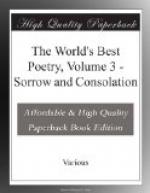Beneath an Indian palm a girl
Of other blood reposes;
Her cheek is clear and pale as pearl
Amid that wild of roses.
Beside a northern pine a boy
Is leaning fancy-bound.
Nor listens where with noisy joy
Awaits the impatient hound.
Cool grows the sick and feverish calm,
Relaxed the frosty twine.—
The pine-tree dreameth of the palm,
The palm-tree of the pine.
As soon shall nature interlace
Those dimly-visioned boughs,
As these young lovers face to face
Renew their early vows.
From the German of HEINRICH HEINE.
Translation of RICHARD MONCKTON MILNES, LORD HOUGHTON.
CUMNOR HALL.
[SAID TO HAVE BEEN THE
SUGGESTIVE ORIGIN OF SCOTT’S
“KENILWORTH.”]
The dews of summer night did fall;
The moon, sweet regent of the sky,
Silvered the walls of Cumnor Hall,
And many an oak that grew thereby.
Now naught was heard beneath the skies,
The sounds of busy life were still,
Save an unhappy lady’s sighs,
That issued from that lonely pile.
“Leicester,” she cried, “is this
thy love
That thou so oft hast sworn to me,
To leave me in this lonely grove,
Immured in shameful privity?
“No more thou com’st with lover’s
speed,
Thy once beloved bride to see;
But be she alive, or be she dead,
I fear, stern Earl, ’s the same
to thee.
“Not so the usage I received
When happy in my father’s hall;
No faithless husband then me grieved,
No chilling fears did me appal.
“I rose up with the cheerful morn,
No lark more blithe, no flower more gay
And like the bird that haunts the thorn,
So merrily sung the livelong day.
“If that my beauty is but small,
Among court ladies all despised,
Why didst thou rend it from that hall,
Where, scornful Earl, it well was prized?
“And when you first to me made suit,
How fair I was, you oft would say!
And proud of conquest, plucked the fruit,
Then left the blossom to decay.
“Yes! now neglected and despised,
The rose is pale, the lily’s dead;
But he, that once their charms so prized,
Is sure the cause those charms are fled.
“For know, when sick’ning grief doth prey,
And tender love’s repaid with scorn,
The sweetest beauty will decay,—
What floweret can endure the storm?
“At court, I’m told, is beauty’s
throne,
Where every lady’s passing rare,
That Eastern flowers, that shame the sun,
Are not so glowing, not so fair.
“Then, Earl, why didst thou leave the beds
Where roses and where lilies vie,
To seek a primrose, whose pale shades
Must sicken when those gauds are by?
“’Mong rural beauties I was one,
Among the fields wild flowers are fair;
Some country swain might me have won,
And thought my beauty passing rare.




